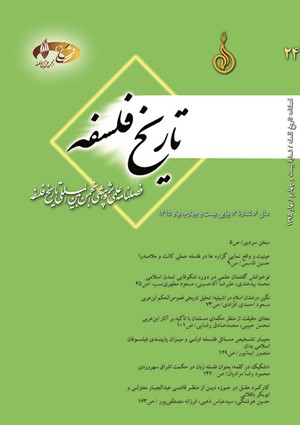کارکرد عقل در حوزه دين از منظر قاضي عبدالجبار معتزلي و ابوبکر باقلاني
محورهای موضوعی : ریشهشناسی واژگان (اتیمولوژی) فلسفی
1 - دانشگاه آزاد اسلامی
کلید واژه: حسن و قبح عقلي حسن و قبح شرعي عقلگرايي نقلگرايي تأويل,
چکیده مقاله :
مقاله پيشرو، با استفاده از روش توصيفي تحليلي به بررسي کارکرد عقل در حوزه دين در انديشه کلامي قاضي عبدالجبار معتزلي و قاضي ابوبکر باقلاني پرداخته است. در همين راستا، رويکرد عقلاني هر دو، در تفسير قرآن و کارکرد عقل در حصول احکام شرعي دين، مورد مقايسه و بررسي قرار گرفته است. حاصل اين بررسي نشان ميدهد آنچه اين دو را از هم متمايز ميکند بيش از هرچيز، رويکرد آنها در مواجهه باعقل و چند و چون نسبت آن با وحي است. بنابر اين تحقيق، قاضي عبدالجبار به عقل و استدلالهاي عقلي اصالت داده، همواره در فهم کلامي خود از دين، عقل را بعنوان ابزار شناخت بکار گرفته و حتي گاه در موارد تعارض حکم عقل با ظاهر آيات و روايات بي محابا، اولويت نخست را به عقل داده و براحتي به تأويل يا نفي اعتبار گزارههاي مخالف عقل پرداخته است. ترجيح نقل بر عقل و اولويت نص نازل شده اعم از قرآن، سنت و عمل صحابه، مهمترين اصل معرفتشناختي باقلاني است. با اين حال نظام فکري باقلاني، در واقع آغاز ورود کلام اشاعره به مقدمات عقلي بود که قواعد عقلي را تابع عقايد ميدانست و معتقد بود که ايمان به مفاد و مضمون آنها واجب است. زيرا اين ادله، متوقف بر عقايد مزبور است.
The present paper investigates the functions of reason in the realm of religion in the kalami thoughts of Qadi Abd al-Jabbar Mu‘tazili and Qadi Abubakr Baqillani following a descriptive-analytic method. In doing so, it compares and examines the rational approaches of both thinkers to the interpretation of the Qur’an and applications of reason in inferring religious principles. The results of this study indicate that what distinguishes these two great figures from each other more than anything else is their approach to reason and the quality of its relationship with revelation. Qadi Abd al-Jabbar believes in the priority of reason and rational arguments and always resorts to reason as a tool for gaining knowledge in his kalami perception of religion. Sometimes, in cases where rational judgment is in contrast to the exoteric meaning of Qur’anic verses and traditions, he even gives the priority to reason with no reservation and firmly interprets or negates the validity of propositions which stand against reason. However, preferring tradition to the intellect and granting priority to the descended texts, including the Qur’an, traditions, and those on the acts of the Prophet’s companions are the most important epistemological principles of Baqillani. However, his philosophical system, in fact, marked the beginning of Ash‘arite kalam’s treatment of rational premises. The Ash‘arite considered rational principles to depend on beliefs and, thus, believed that it was first necessary to have faith in their content.
